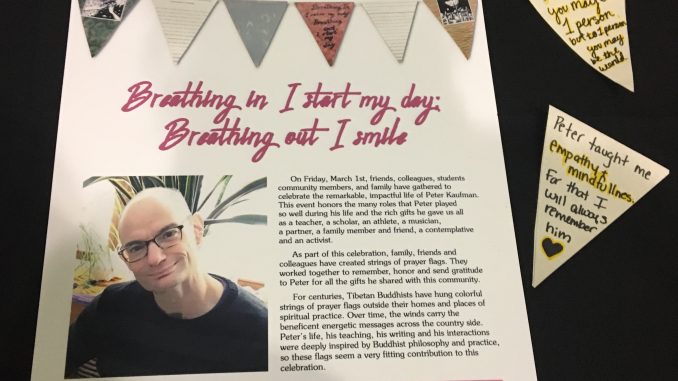
“I’m dying,” wrote SUNY New Paltz sociology professor Peter Kaufman.
“I don’t mean this figuratively—like I’m dying of thirst or dying to visit Hawaii. I mean it quite literally. I have incurable, stage IV lung cancer.”
On Nov. 19, 2018, the highly respected and well-loved professor, colleague, friend and family member passed away at the age of 51, leaving behind a legacy that touched many.
Kaufman earned his Ph.D. in sociology from Stony Brook University, and joined the SUNY New Paltz faculty in 1999. His teaching focused on sociology topics like education, social justice equity and the sociology of sport. He was a frequent research advisor for students, and was honored with the SUNY Chancellor’s Award for Excellence in Teaching back in 2011.
Kaufman is survived by his wife, Leigh Weaver, his parents, Toby and Barry Kaufman, his brothers, Jon and Joshua and his greyhound, Billy.
“He is also survived by hundreds of colleagues in the New Paltz community, and thousands more students and alumni, who remember him as a teacher, a researcher, a sociologist, a writer, an activist, a musician, an athlete and a kind and caring friend,” said a SUNY New Paltz News article.
A remembrance event for Kaufman was held on Friday, March 1 in the Student Union Building’s multi-purpose room (MPR).
Every seat was filled and the walls of the MPR were lined with colleagues, community members, friends, students and family members who were touched by Kaufman’s remarkable and impactful existence.
SUNY New Paltz President Donald P. Christian, department chair of sociology Sunita Bose and various former students voiced their personal experiences with Kaufman and discussed how he touched their lives.
“His death is a great loss to the community and I again want to offer condolences to his many family, friends, and colleagues among the faculty staff who continue to mourn his passing and to the students and alumni who had the privilege of knowing him,” Christian said. “At the same time, we are celebrating a wonderful life well lived.”
Despite Kaufman living an incredibly healthy life—never having smoked a cigarette, tried illegal drugs or gotten drunk—he was tragically diagnosed with stage IV lung cancer in 2017.
However, Kaufman did not take his inevitable death sitting down. It is only fitting that an individual as unique as Kaufman would respond to death in such a unique way. While most people would respond to their tragic fate of death with anger, denial or sadness, Kaufman interpreted his diagnosis as a “teachable moment.”
In September of 2018, Kaufman published a moving and personal post on the Everyday Sociology blog entitled “A Sociology of My Death.”
“Many of us were deeply moved by his decision to be incredibly open about his experience living with an incurable terminable illness,” Christian said. “I encourage everyone to read his personal blog post.”
On Oct. 30, 2018, Kaufman held a public discussion called “On Death and Dying.” The event was so well-attended that it had to be moved to a room with more seating before the event could begin.
“I believe it [the social processes of his illness and death] can be extremely useful by providing guidance for how to act with compassion and by highlighting social practices that many fail to see,” Kaufman said. “Exploring the sociological aspects of illness and dying might even foster policy changes that could ameliorate some of the unnecessary suffering that’s often part and parcel of confronting the incurable.”
As a part of celebrating his life, attendees of the remembrance event created strings of prayer flags to show gratitude for all the gifts Kaufman shared with the community.
For centuries, Tibetan Buddhists have hung strings of prayer flags outside their homes and places of spiritual practice. Kaufman’s life, teaching, writing and interactions were deeply inspired by Buddhist philosophy and practice, so flags appeared like a very fitting contribution to this celebration.
“Peter was so generous in so many ways,” Christian said. “He truly modeled for all of us how to live life fully and in service to others.”

